Add one to a number represented by LL
Given the head of a singly linked list representing a positive integer number. Each node of the linked list represents a digit of the number, with the 1st node containing the leftmost digit of the number and so on. The task is to add one to the value represented by the linked list and return the head of a linked list containing the final value.
The number will contain no leading zeroes except when the value represented is zero itself.
Examples:
Input: head -> 1 -> 2 -> 3
Output: head -> 1 -> 2 -> 4
Explanation: The number represented by the linked list = 123.
123 + 1 = 124.
Input: head -> 9 -> 9
Output: head -> 1 -> 0 -> 0
Explanation: The number represented by the linked list = 99.
99 + 1 = 100.
Input: head -> 9
Constraints
- 0 <= number of nodes in the Linked List <= 105
- 0 <= ListNode.val <= 9
- No leading zeroes in the value represented.
Hints
- A brute-force approach involves Converting the linked list to an integer (O(n)). Adding 1, then reconstructing the linked list (O(n)). Drawback: Uses extra memory (O(n)) for number conversion.
- Reverse the linked list (O(n)) to make the least significant digit the head. Perform normal addition with carry (O(n)). Reverse the linked list back (O(n)) to restore order.
Company Tags
Editorial
Intuition
Imagine you have a number represented as a linked list, where each node contains a single digit. The first node contains the leftmost digit. Our goal is to add one to this number. This might sound simple, but we need to handle the digit carry-over, just like we do when adding numbers manually. Starting from the rightmost digit makes it easier to manage carry-overs. However, since our linked list starts from the leftmost digit, we need to reverse the list first. This makes it easier to add one from the least significant digit and manage any carry-over.
Approach
- Reverse the Linked List: Reverse the linked list so we can start the addition from the rightmost digit.
- Add One: Add one to the first digit of the reversed list. If there’s a carry (result is 10), set the current digit to 0 and carry over 1 to the next digit.
- Handle the Carry: If there’s still a carry after reaching the end of the list, add a new node with the digit 1.
- Reverse Again: Reverse the list again to restore the original order, now with the added value.
- Return the New Head: Return the head of the modified linked list.
Dry Run
Without Carry
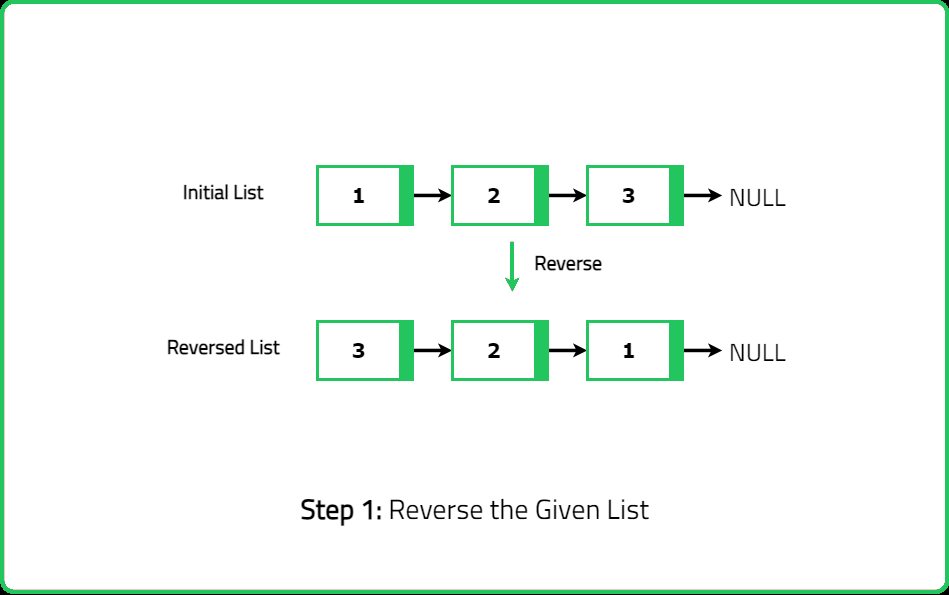
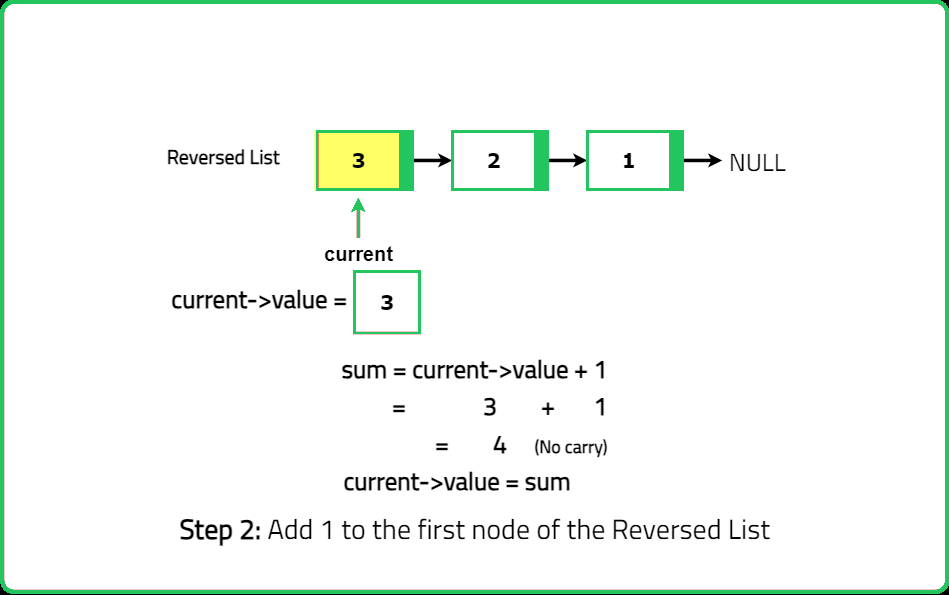
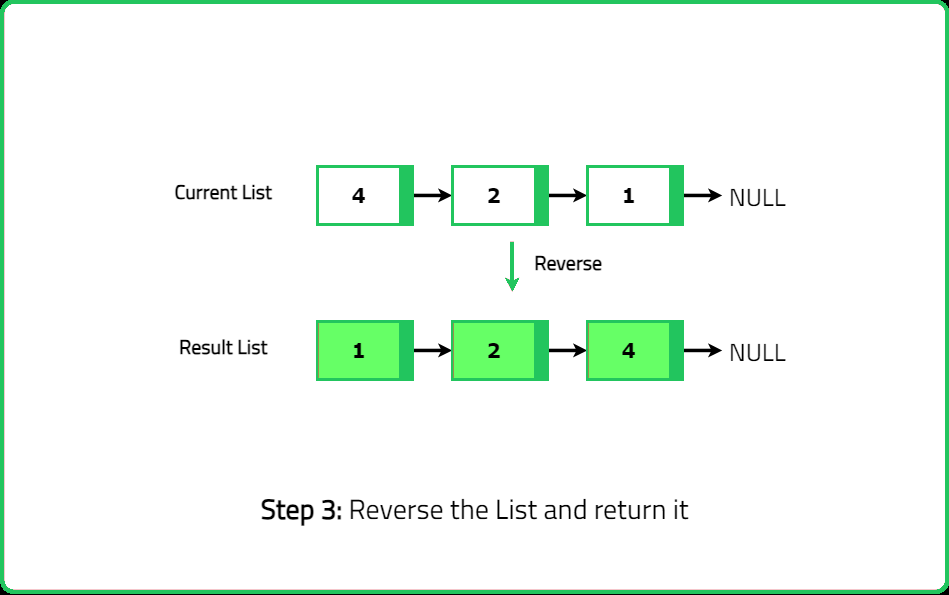



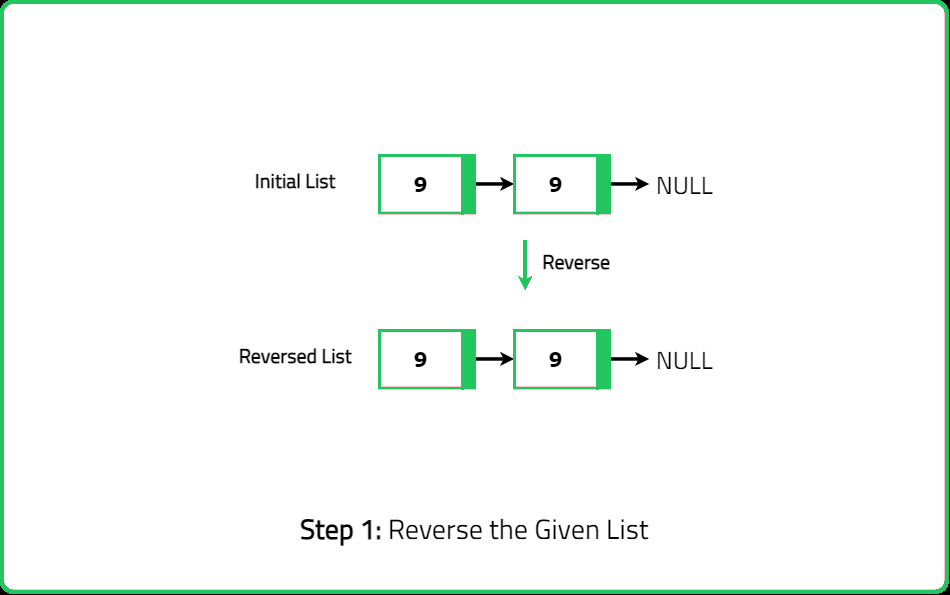
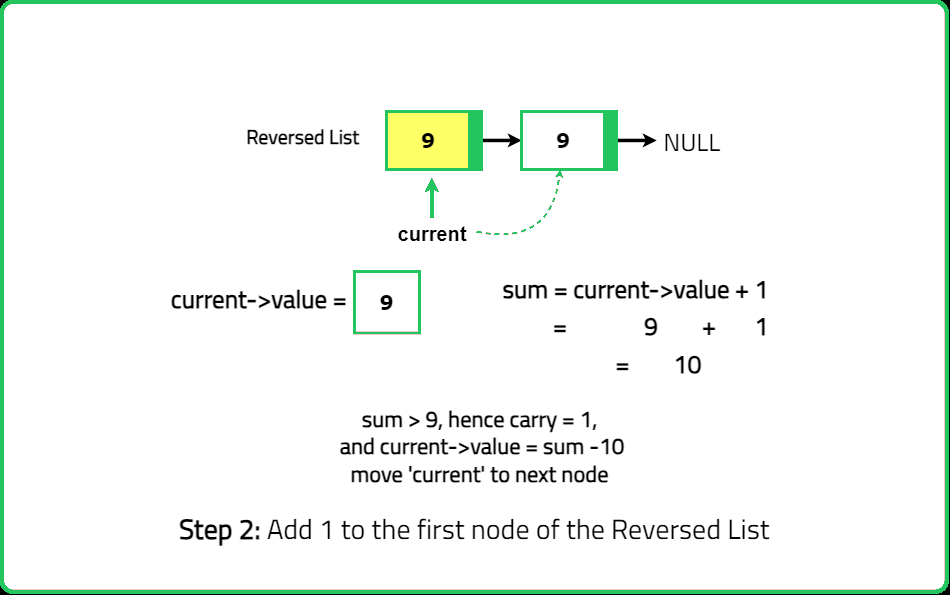
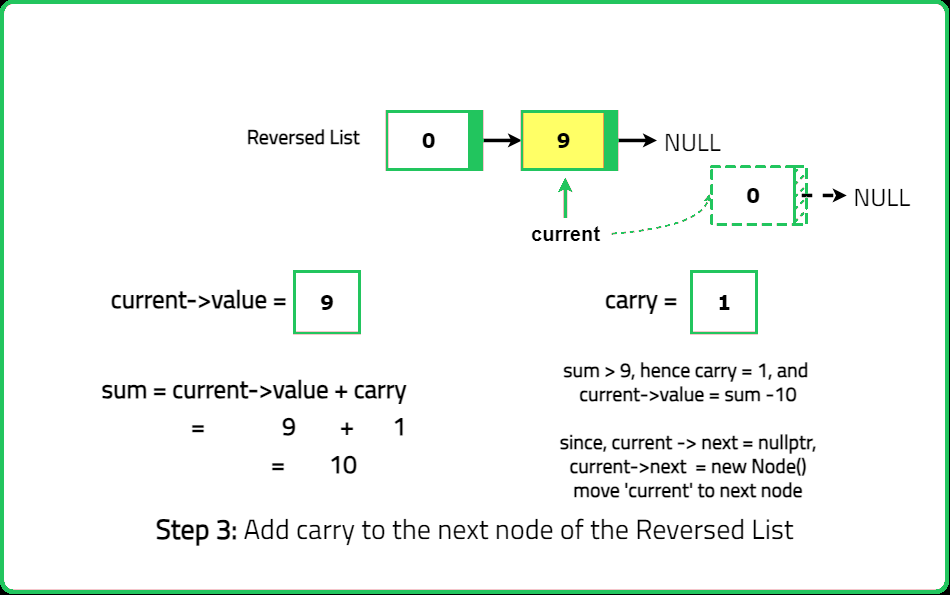
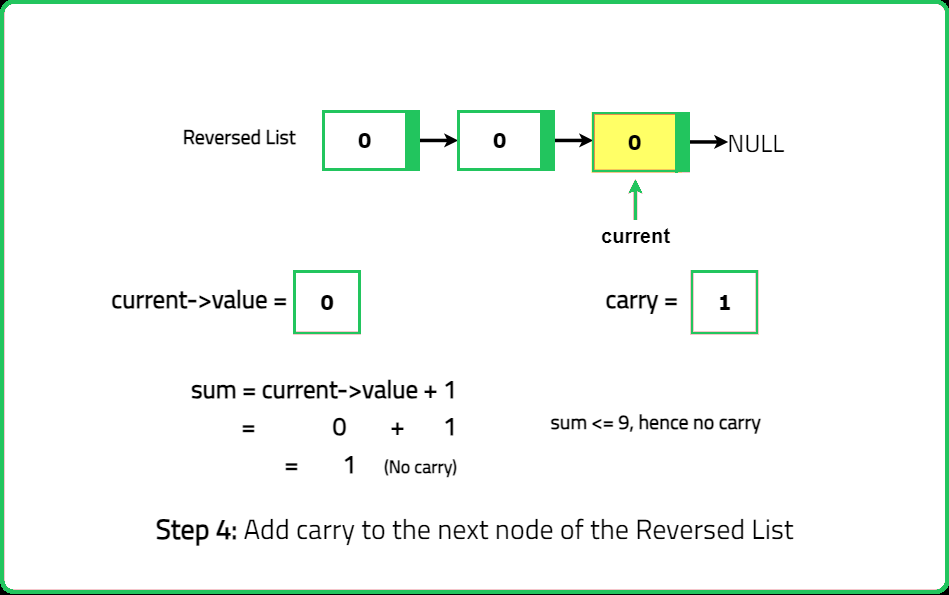
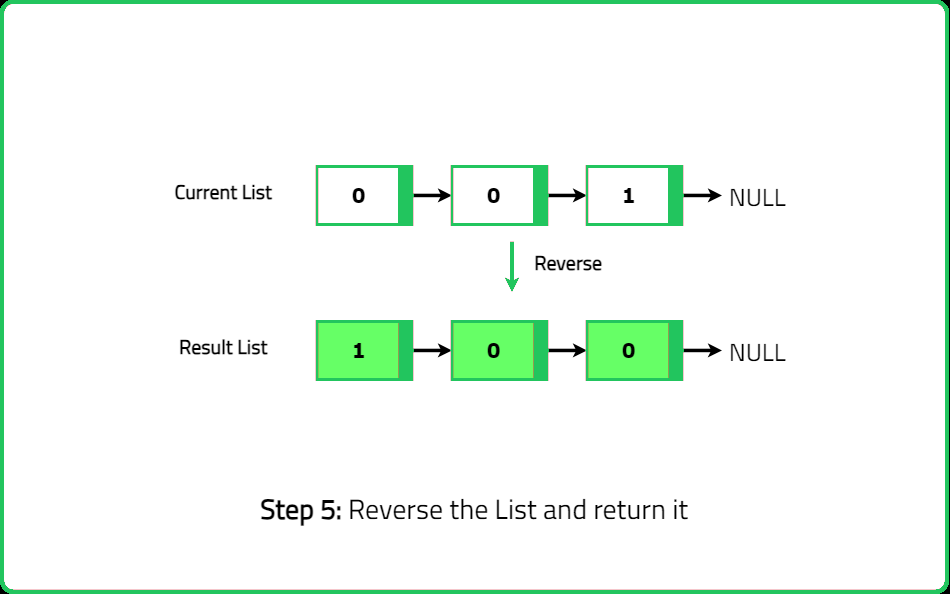





#include <bits/stdc++.h>
using namespace std;
//Definition of
//Single linked list
struct ListNode
{
int val;
ListNode *next;
ListNode()
{
val = 0;
next = NULL;
}
ListNode(int data1)
{
val = data1;
next = NULL;
}
ListNode(int data1, ListNode *next1)
{
val = data1;
next = next1;
}
};
class Solution {
public:
//Function to reverse the linked list
ListNode* reverseList(ListNode* head) {
// Initialize pointers
ListNode* prev = NULL;
ListNode* current = head;
ListNode* next = NULL;
while (current != NULL) {
// Store next node
next = current->next;
// Reverse the link
current->next = prev;
// Move prev to current
prev = current;
// Move current to next
current = next;
}
return prev;
}
//Function to add one to Linked List
ListNode *addOne(ListNode *head) {
//Reverse the linked list
head = reverseList(head);
//Create a dummy node
ListNode* current = head;
//Initialize carry with 1
int carry = 1;
while (current != NULL) {
/*Sum the current node's value
and the carry*/
int sum = current->val + carry;
//Update carry
carry = sum / 10;
//Update the node's value
current->val = sum % 10;
/*If no carry left
break the loop*/
if (carry == 0) {
break;
}
/*If we've reached the end of the list
there's still a carry,
add a new node with the carry value*/
if (current->next == NULL && carry != 0) {
current->next = new ListNode(carry);
break;
}
// Move to the next node
current = current->next;
}
// Reverse the list
head = reverseList(head);
// New head
return head;
}
};
//Function to print the linked list
void printList(ListNode* head) {
while (head != NULL) {
cout << head->val << " ";
head = head->next;
}
cout << endl;
}
int main() {
//Creation of Linked List
ListNode* head1 = new ListNode(1);
head1->next = new ListNode(2);
head1->next->next = new ListNode(3);
//Solution instance
Solution solution;
head1 = solution.addOne(head1);
cout << "Result after adding one: ";
printList(head1);
return 0;
}import java.util.*;
// Definition of singly linked list
class ListNode {
int val;
ListNode next;
ListNode() {
val = 0;
next = null;
}
ListNode(int data1) {
val = data1;
next = null;
}
ListNode(int data1, ListNode next1) {
val = data1;
next = next1;
}
}
class Solution {
// Function to reverse the linked list
public ListNode reverseList(ListNode head) {
// Initialize pointers
ListNode prev = null;
ListNode current = head;
ListNode next = null;
while (current != null) {
// Store next node
next = current.next;
// Reverse the link
current.next = prev;
// Move prev to current
prev = current;
// Move current to next
current = next;
}
return prev;
}
// Function to add one to Linked List
public ListNode addOne(ListNode head) {
// Reverse the linked list
head = reverseList(head);
// Create a dummy node
ListNode current = head;
// Initialize carry with 1
int carry = 1;
while (current != null) {
/* Sum the current node's value
and the carry */
int sum = current.val + carry;
// Update carry
carry = sum / 10;
// Update the node's value
current.val = sum % 10;
/* If no carry left
break the loop */
if (carry == 0) {
break;
}
/* If we've reached the end of the list
and there's still a carry,
add a new node with the carry value */
if (current.next == null && carry != 0) {
current.next = new ListNode(carry);
break;
}
// Move to the next node
current = current.next;
}
// Reverse the list
head = reverseList(head);
// New head
return head;
}
}
// Function to print the linked list
public static void printList(ListNode head) {
while (head != null) {
System.out.print(head.val + " ");
head = head.next;
}
System.out.println();
}
public static void main(String[] args) {
// Creation of Linked List
ListNode head1 = new ListNode(1);
head1.next = new ListNode(2);
head1.next.next = new ListNode(3);
// Solution instance
Solution solution = new Solution();
head1 = solution.addOne(head1);
System.out.print("Result after adding one: ");
printList(head1);
}
# Definition of singly linked list
class ListNode:
def __init__(self, val=0, next=None):
self.val = val
self.next = next
class Solution:
# Function to reverse the linked list
def reverseList(self, head: ListNode) -> ListNode:
# Initialize pointers
prev = None
current = head
next = None
while current is not None:
# Store next node
next = current.next
# Reverse the link
current.next = prev
# Move prev to current
prev = current
# Move current to next
current = next
return prev
# Function to add one to Linked List
def addOne(self, head: ListNode) -> ListNode:
# Reverse the linked list
head = self.reverseList(head)
# Create a dummy node
current = head
# Initialize carry with 1
carry = 1
while current is not None:
# Sum the current node's value and the carry
sum = current.val + carry
# Update carry
carry = sum // 10
# Update the node's value
current.val = sum % 10
# If no carry left, break the loop
if carry == 0:
break
# If we've reached the end of the list and there's still a carry,
# add a new node with the carry value
if current.next is None and carry != 0:
current.next = ListNode(carry)
break
# Move to the next node
current = current.next
# Reverse the list
head = self.reverseList(head)
# New head
return head
# Function to print the linked list
def printList(head: ListNode):
while head is not None:
print(head.val, end=" ")
head = head.next
print()
if __name__ == "__main__":
# Creation of Linked List
head1 = ListNode(1)
head1.next = ListNode(2)
head1.next.next = ListNode(3)
# Solution instance
solution = Solution()
head1 = solution.addOne(head1)
print("Result after adding one: ", end="")
printList(head1)
// Definition of singly linked list
class ListNode {
constructor(val = 0, next = null) {
this.val = val;
this.next = next;
}
}
class Solution {
// Function to reverse the linked list
reverseList(head) {
// Initialize pointers
let prev = null;
let current = head;
let next = null;
while (current !== null) {
// Store next node
next = current.next;
// Reverse the link
current.next = prev;
// Move prev to current
prev = current;
// Move current to next
current = next;
}
return prev;
}
// Function to add one to Linked List
addOne(head) {
// Reverse the linked list
head = this.reverseList(head);
// Create a dummy node
let current = head;
// Initialize carry with 1
let carry = 1;
while (current !== null) {
// Sum the current node's value and the carry
let sum = current.val + carry;
// Update carry
carry = Math.floor(sum / 10);
// Update the node's value
current.val = sum % 10;
// If no carry left, break the loop
if (carry === 0) {
break;
}
// If we've reached the end of the list and there's still a carry,
// add a new node with the carry value
if (current.next === null && carry !== 0) {
current.next = new ListNode(carry);
break;
}
// Move to the next node
current = current.next;
}
// Reverse the list
head = this.reverseList(head);
// New head
return head;
}
}
// Function to print the linked list
function printList(head) {
while (head !== null) {
process.stdout.write(head.val + " ");
head = head.next;
}
console.log();
}
// Creation of Linked List
let head1 = new ListNode(1);
head1.next = new ListNode(2);
head1.next.next = new ListNode(3);
// Solution instance
const solution = new Solution();
head1 = solution.addOne(head1);
console.log("Result after adding one: ");
printList(head1);
Complexity Analysis
Time Complexity: O(N) because we traverse the linked list three times, each with a time complexity ofO(N), resulting in O(3N), which simplifies to O(N) since constant factors are ignored in Big-O notation. Here, N is the number of nodes in the linked list.
Space Complexity: O(1) because we use a constant amount of extra space for pointers and variables.
Intuition
When adding one to a number represented as a linked list, think of it as the process of incrementing the least significant digit (the last node) and propagating any carry to the more significant digits (the previous nodes). This process is similar to the manual addition we do with pen and paper. Starting from the least significant digit, if there is a carry (i.e., the digit becomes 10 after addition), set the current digit to 0 and move the carry to the next significant digit. If there's still a carry after processing the most significant digit (the head of the list), we need to add a new node to the front of the list to accommodate the carry.Approach
-
To add one to a number represented as a linked list, we use a recursive function addHelper. This function traverses the list to the end, with the base case being when the current node is NULL, returning a carry of 1 to signify adding one to the number.
-
During each recursive call, we add the carry returned by the next node to the current node's value. If the current node's value is less than 10, no further carry is needed, so we return 0. If the value is 10 or more, we set the current node's value to 0 and return a carry of 1 to be added to the next significant digit.
-
After processing all nodes, we check if there's a carry left. If there is, we create a new node with a value of 1 and set it as the new head of the list. This handles cases where an additional digit is needed, like converting 999 into 1000.
Dry Run
For a detailed dry run, refer to the video.#include <bits/stdc++.h>
using namespace std;
// Definition of singly linked list
struct ListNode {
int val;
ListNode *next;
ListNode() : val(0), next(NULL) {}
ListNode(int data1) : val(data1), next(NULL) {}
ListNode(int data1, ListNode *next1) : val(data1), next(next1) {}
};
class Solution {
public:
// Helper function to add one to the linked list
int addHelper(ListNode* temp) {
/*If the list is empty
return a carry of 1*/
if(temp == NULL)
return 1;
/*Recursively call addHelper
For the next node*/
int carry = addHelper(temp->next);
/*Add the carry
to the current node's value*/
temp->val += carry;
/*If the current node's value
is less than 10
no further carry is needed*/
if(temp->val < 10)
return 0;
/* If the current node's value is 10 or more
set it to 0 and return a carry of 1*/
temp->val = 0;
return 1;
}
ListNode *addOne(ListNode *head) {
/*Call the helper function
to start the addition process*/
int carry = addHelper(head);
/*If there is a carry left
after processing all nodes
add a new node at the head */
if(carry == 1) {
ListNode* newNode = new ListNode(1);
/*Link the new node to the current head*/
newNode->next = head;
/*Update the head to the new node*/
head = newNode;
}
// Return the head
return head;
}
};
//Function to print the linked list
void printLinkedList(ListNode* head) {
ListNode* temp = head;
// Traverse the linked list and print each node's value
while (temp != nullptr) {
std::cout << temp->val << " ";
temp = temp->next;
}
std::cout << std::endl;
}
int main() {
//Create a linked list with values 9, 9, 9 (999 + 1 = 1000)
ListNode* head = new ListNode(9);
head->next = new ListNode(9);
head->next->next = new ListNode(9);
//Print the original linked list
cout << "Original Linked List: ";
printLinkedList(head);
//Add one to the linked list
Solution sol;
head = sol.addOne(head);
//Print the modified linked list
cout << "Linked List after adding one: ";
printLinkedList(head);
return 0;
}import java.util.*;
// Definition of singly linked list
class ListNode {
int val;
ListNode next;
ListNode() {
val = 0;
next = null;
}
ListNode(int data1) {
val = data1;
next = null;
}
ListNode(int data1, ListNode next1) {
val = data1;
next = next1;
}
}
class Solution {
// Helper function to add one to the linked list
private int addHelper(ListNode temp) {
/* If the list is empty
return a carry of 1 */
if (temp == null)
return 1;
/* Recursively call addHelper
For the next node */
int carry = addHelper(temp.next);
/* Add the carry
to the current node's value */
temp.val += carry;
/* If the current node's value
is less than 10
no further carry is needed */
if (temp.val < 10)
return 0;
/* If the current node's value is 10 or more
set it to 0 and return a carry of 1 */
temp.val = 0;
return 1;
}
public ListNode addOne(ListNode head) {
/* Call the helper function
to start the addition process */
int carry = addHelper(head);
/* If there is a carry left
after processing all nodes
add a new node at the head */
if (carry == 1) {
ListNode newNode = new ListNode(1);
/* Link the new node to the current head */
newNode.next = head;
/* Update the head to the new node */
head = newNode;
}
// Return the head
return head;
}
}
// Function to print the linked list
public static void printLinkedList(ListNode head) {
ListNode temp = head;
// Traverse the linked list and print each node's value
while (temp != null) {
System.out.print(temp.val + " ");
temp = temp.next;
}
System.out.println();
}
public static void main(String[] args) {
// Create a linked list with values 9, 9, 9 (999 + 1 = 1000)
ListNode head = new ListNode(9);
head.next = new ListNode(9);
head.next.next = new ListNode(9);
// Print the original linked list
System.out.print("Original Linked List: ");
printLinkedList(head);
// Add one to the linked list
Solution sol = new Solution();
head = sol.addOne(head);
// Print the modified linked list
System.out.print("Linked List after adding one: ");
printLinkedList(head);
}
# Definition of singly linked list
class ListNode:
def __init__(self, val=0, next=None):
self.val = val
self.next = next
class Solution:
# Helper function to add one to the linked list
def addHelper(self, temp: ListNode) -> int:
''' If the list is empty
return a carry of 1 '''
if temp is None:
return 1
''' Recursively call addHelper
For the next node '''
carry = self.addHelper(temp.next)
''' Add the carry
to the current node's value '''
temp.val += carry
''' If the current node's value
is less than 10
no further carry is needed '''
if temp.val < 10:
return 0
''' If the current node's value is 10 or more
set it to 0 and return a carry of 1 '''
temp.val = 0
return 1
def addOne(self, head: ListNode) -> ListNode:
''' Call the helper function
to start the addition process '''
carry = self.addHelper(head)
''' If there is a carry left
after processing all nodes
add a new node at the head '''
if carry == 1:
newNode = ListNode(1)
''' Link the new node to the current head '''
newNode.next = head
''' Update the head to the new node '''
head = newNode
# Return the head
return head
# Function to print the linked list
def printLinkedList(head: ListNode):
temp = head
# Traverse the linked list and print each node's value
while temp:
print(temp.val, end=" ")
temp = temp.next
print()
if __name__ == "__main__":
# Create a linked list with values 9, 9, 9 (999 + 1 = 1000)
head = ListNode(9)
head.next = ListNode(9)
head.next.next = ListNode(9)
# Print the original linked list
print("Original Linked List: ", end="")
printLinkedList(head)
# Add one to the linked list
solution = Solution()
head = solution.addOne(head)
# Print the modified linked list
print("Linked List after adding one: ", end="")
printLinkedList(head)
// Definition of singly linked list
class ListNode {
constructor(val = 0, next = null) {
this.val = val;
this.next = next;
}
}
class Solution {
// Helper function to add one to the linked list
addHelper(temp) {
/* If the list is empty
return a carry of 1 */
if (temp === null)
return 1;
/* Recursively call addHelper
For the next node */
let carry = this.addHelper(temp.next);
/* Add the carry
to the current node's value */
temp.val += carry;
/* If the current node's value
is less than 10
no further carry is needed */
if (temp.val < 10)
return 0;
/* If the current node's value is 10 or more
set it to 0 and return a carry of 1 */
temp.val = 0;
return 1;
}
addOne(head) {
/* Call the helper function
to start the addition process */
let carry = this.addHelper(head);
/* If there is a carry left
after processing all nodes
add a new node at the head */
if (carry === 1) {
let newNode = new ListNode(1);
/* Link the new node to the current head */
newNode.next = head;
/* Update the head to the new node */
head = newNode;
}
// Return the head
return head;
}
}
// Function to print the linked list
function printLinkedList(head) {
let temp = head;
// Traverse the linked list and print each node's value
while (temp !== null) {
process.stdout.write(temp.val + " ");
temp = temp.next;
}
console.log();
}
// Create a linked list with values 9, 9, 9 (999 + 1 = 1000)
let head = new ListNode(9);
head.next = new ListNode(9);
head.next.next = new ListNode(9);
// Print the original linked list
console.log("Original Linked List: ");
printLinkedList(head);
// Add one to the linked list
const solution = new Solution();
head = solution.addOne(head);
// Print the modified linked list
console.log("Linked List after adding one: ");
printLinkedList(head);
Complexity Analysis
Time Complexity: O(N), where N is the number of nodes in the linked list. This is because each node in the linked list is visited exactly once by the recursiveaddHelper function. The process involves traversing the entire list to reach the end, and then propagating the carry back through each node, resulting in a linear time complexity of O(N).
Space Complexity: O(N), due to the recursion stack. Since the addHelper function calls itself recursively for each node in the list, the maximum depth of the recursion stack is N, where N is the number of nodes in the linked list. This means the space required for the recursion stack grows linearly with the size of the list, leading to a space complexity of O(N).
Frequently Occurring Doubts
Q: Why do we reverse the list first?
A: The easiest place to add 1 is at the least significant digit, which is at the end of the list. Reversing the list makes addition simpler (just like manual addition from right to left).
Q: Can this be solved without reversing the list?
A: Yes, using recursion (O(n) space) to reach the last node first. However, recursion consumes stack space, making it less efficient than an iterative solution.
Interview Followup Questions
Q: Can this problem be solved using a stack instead of reversing?
A: Yes! Push all values into a stack (O(n) space), then pop and add 1.
Notes
Code
1 2 4
1 0 0
10
Facts
- • This problem exercises the fundamental concept of linked list manipulation which finds real-world application in modern software systems
- • For instance, web browsers' history function is implemented via a doubly linked list, each node representing a visited webpage
- • When a user clicks on a link, a node is added to the list
- • When they click 'back' or 'forward', the browser traverses the list to the previous or next node, respectively
- • Thus, being able to manipulate linked lists, like the problem describes, is crucial in creating effective navigation functionality in web browsers